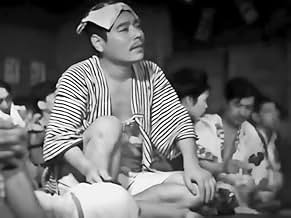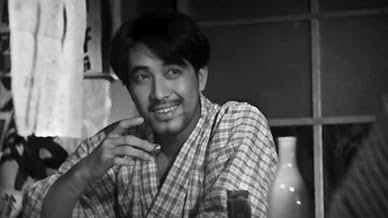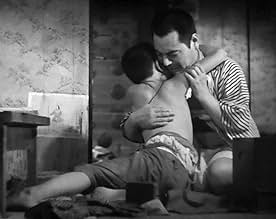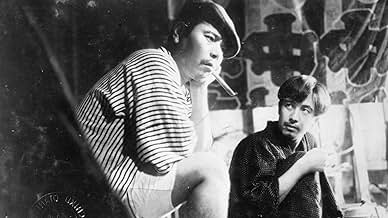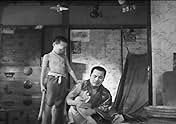AVALIAÇÃO DA IMDb
7,2/10
1,5 mil
SUA AVALIAÇÃO
Adicionar um enredo no seu idiomaTwo Tokyo co-workers come across a destitute young lady in search of a place to live.Two Tokyo co-workers come across a destitute young lady in search of a place to live.Two Tokyo co-workers come across a destitute young lady in search of a place to live.
- Direção
- Roteiristas
- Artistas
- Prêmios
- 1 vitória no total
Den Ôhinata
- Jiro
- (as Den Obinata)
Tomio Aoki
- Tomio
- (as Tokkan Kozô)
Chishû Ryû
- Man on boat
- (não creditado)
Hideo Sugawara
- Boy Taunting Tomio
- (não creditado)
- Direção
- Roteiristas
- Elenco e equipe completos
- Produção, bilheteria e muito mais no IMDbPro
Avaliações em destaque
10kerpan
Dekigokoro (Passing Fancy), is one of Ozu's 3 masterpieces from 1933. It stars the second of cinematic Ozu's "alter egos", Takeshi Sakamoto. Sakamoto typically plays a down and out working class father. Here, he is especially dense, to excellent comic effect. Tomio Aoki (in probably his most significant child role) plays a kid who seems to be considerably brighter than his father -- and who does more to keep the household running. Aoki is (of course) quite funny. But he also does an excellent job of showing a child's response to unwanted change. He and his father have long depended solely on each other -- but now his father has his eye on a young woman who has moved into their slum neighborhood. Aoki very much resents his father's interest in the woman -- and resists her attempts to win his affections.
This is an extremely visual film, with lots of completely "wordless" humor. The film starts out with an extended scene in a music hall (Chishu Ryu performing as the "singer") in which first a lost wallet circulates, and then a flea (or fleas). Probably not as great a family drama as the prior "I Was Born But" or the subsequent "Tokyo Inn", but nonetheless quite enjoyable.
This is an extremely visual film, with lots of completely "wordless" humor. The film starts out with an extended scene in a music hall (Chishu Ryu performing as the "singer") in which first a lost wallet circulates, and then a flea (or fleas). Probably not as great a family drama as the prior "I Was Born But" or the subsequent "Tokyo Inn", but nonetheless quite enjoyable.
Takeshi Sakamoto and Tokan Kozzo team up memorably yet again as an unemployed illiterate drunk and his resentful son, in this sentimental study of working class father-son relationships. As in I WAS BORN BUT... and TOKYO CHORUS, Ozu explores how children measure their self-esteem in their parents.
(1933) Passing Fancy/ Dekigokoro
SILENT DRAMA
Co-written and directed by Yasujirô Ozu that opens with a group of people sitting around listening to the speaker talking about the latest news. By the time it was over, the movie then focuses on the single father, Kihachi Kimura (Takeshi Sakamoto) his son, Tomio Kimura (Tomio Aoki) who is on the third grade; his best friend and neighbor, Jiro (Den Obinata) and the old lady, Otome (Chôko Iida) who kind of lives with them. When one day, a young lady, Harue (Nobuko Fushimi) who dresses like a geisha is wondering around homeless, with Kihachi taking her under his wing. We then learn more about them and their daily lives. For instance, Kihachi and his best friend, Jiro both work in a factory and do not enjoy it, and that Tomio consistently have to wake them up every morning to go to work, in which they sometimes often show up late.
The movie starts out routinely, and it did not become interesting until the father, Kihachi began arguing with his son, Tomio. The argument regards that his dad is not the most ideal father because he does not know how to read, and that he often drinks at the bar after he comes home. In other words, he is often an embarrassment to his only son. And the more I know more about the father, the more I wanted to know about what happened to his wife, which could be anything! Or what was his wife like, and how come she is not with him anymore- how did she ever put up with him. The father's life began to intrigue me, and I did not get enough of that as much as I hoped. The movie resonates on some areas, while does not work on others, such as the father, beginning to express interest on Harue! For some reason, I almost dozed off, I guess it's a consistent theme when an older man begins to express interest to a younger lady. I also kind of hoped how the father is able to go through his life without reading and writing. Like, can he at least know how to spell his name!
Co-written and directed by Yasujirô Ozu that opens with a group of people sitting around listening to the speaker talking about the latest news. By the time it was over, the movie then focuses on the single father, Kihachi Kimura (Takeshi Sakamoto) his son, Tomio Kimura (Tomio Aoki) who is on the third grade; his best friend and neighbor, Jiro (Den Obinata) and the old lady, Otome (Chôko Iida) who kind of lives with them. When one day, a young lady, Harue (Nobuko Fushimi) who dresses like a geisha is wondering around homeless, with Kihachi taking her under his wing. We then learn more about them and their daily lives. For instance, Kihachi and his best friend, Jiro both work in a factory and do not enjoy it, and that Tomio consistently have to wake them up every morning to go to work, in which they sometimes often show up late.
The movie starts out routinely, and it did not become interesting until the father, Kihachi began arguing with his son, Tomio. The argument regards that his dad is not the most ideal father because he does not know how to read, and that he often drinks at the bar after he comes home. In other words, he is often an embarrassment to his only son. And the more I know more about the father, the more I wanted to know about what happened to his wife, which could be anything! Or what was his wife like, and how come she is not with him anymore- how did she ever put up with him. The father's life began to intrigue me, and I did not get enough of that as much as I hoped. The movie resonates on some areas, while does not work on others, such as the father, beginning to express interest on Harue! For some reason, I almost dozed off, I guess it's a consistent theme when an older man begins to express interest to a younger lady. I also kind of hoped how the father is able to go through his life without reading and writing. Like, can he at least know how to spell his name!
Ozu has often used the theme of father and son relationships in his films and here he explores a little more besides. Beyond the relationship of Kihachi the father and Tomio the young son you get the widower Kihachi trying to become closer to the pretty, much younger Harue. This silent film speaks volumes about family, about hopes but it is Ozu's light comic touch which makes it another great film of his. It is completely silent but it is compelling, actually a story that could be retold and remade in any corner of the globe. The acting is just about universally good and the film has a lot of heart attached to its sometimes ordinary theme. Then again, Ozu has always made extraordinary out of the ordinary. Here is another example of the master at work.
This rarely screened silent gem shows Ozu rather early in his career. It presents the story of a poor factory worker trying to raise his son despite many obstacles and hardships. The biggest obstacle of all is the father himself who, though well intentioned and charismatic, makes one mistake in judgment after another. The father manages to get through all his many trials and tribulations thanks to the support (not always warmly) given by his friends and neighbors.
The most interesting thing for me about Passing Fancy is the way it uses a quite hard boiled, gritty realism and coarsely drawn, boorish characters to elicit very tender feelings in the viewer. The mixture of humor and pathos that advances the plot would be impossible for lesser directors or a weak cast to pull off, but in the hands of this troupe the whole enterprise succeeds wonderfully. Somehow, you may find yourself tempted to cry despite the near-total absence of sentimentality.
The acting is excellent all around, but the young boy deserves special mention. To Japanese, particularly at the time, the boy's behavior must have seemed shockingly inappropriate and unfilial, but his antics and facial expressions are very funny.
It is hard to believe that this is one of three movies that Ozu directed in 1933 alone. If the opportunity arises to see this movie, make every effort to see it.
The most interesting thing for me about Passing Fancy is the way it uses a quite hard boiled, gritty realism and coarsely drawn, boorish characters to elicit very tender feelings in the viewer. The mixture of humor and pathos that advances the plot would be impossible for lesser directors or a weak cast to pull off, but in the hands of this troupe the whole enterprise succeeds wonderfully. Somehow, you may find yourself tempted to cry despite the near-total absence of sentimentality.
The acting is excellent all around, but the young boy deserves special mention. To Japanese, particularly at the time, the boy's behavior must have seemed shockingly inappropriate and unfilial, but his antics and facial expressions are very funny.
It is hard to believe that this is one of three movies that Ozu directed in 1933 alone. If the opportunity arises to see this movie, make every effort to see it.
Você sabia?
- CuriosidadesYasujirô Ozu regular Chishû Ryû has a small role towards the end of the film as a fellow passenger on board a ship, playing an uncredited "Man on Boat".
- Erros de gravaçãoKihachi states that 50 sen to a boy his age (referring to Tomio) is like 10 ryo to him and Otome. The ryo was replaced by the yen in 1871, over 60 years earlier. (The yen replaced the ryo at par; there are 100 sen to the yen.)
However, Otome then says, "No, more like 1,000 yen!" So, it's possible "ryo" was still being used synonymously with "yen" over a half-century later.
- ConexõesFeatured in Transcendental Style and Flatulence (2017)
Principais escolhas
Faça login para avaliar e ver a lista de recomendações personalizadas
Detalhes
- Tempo de duração1 hora 40 minutos
- Cor
- Mixagem de som
- Proporção
- 1.37 : 1
Contribua para esta página
Sugerir uma alteração ou adicionar conteúdo ausente

Principal brecha
By what name was Coração Caprichoso (1933) officially released in Canada in English?
Responda
